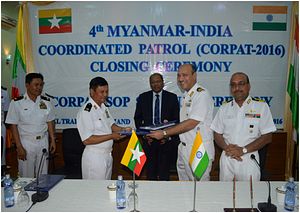India’s army chief is on a four-day visit to Myanmar this week. His trip demonstrates the importance New Delhi places on engaging Naypyidaw as well as efforts by both sides to boost defense cooperation.
As I have noted before, India and Myanmar have been trying to strengthen their defense ties over the past few years. In a general sense, this is part of Indian Prime Minister Narendra Modi’s “Act East” policy – a more action-oriented variation on the “Look East” policy first formulated under then-premier Narasimha Rao in the 1990s, which seeks to strengthen relationships with ASEAN specifically and East Asia more generally (See: “Modi Unveils India’s Act East Policy to ASEAN in Myanmar”).
But more specifically, it is an acknowledgement of the need for Indo-Myanmar security cooperation. Though the focus is often on the naval realm, given the fact that both sides share a long maritime boundary in the strategically significant Andaman Sea and Bay of Bengal, they also share a land border, which has led to concerns around transnational issues. Chief among these is the range of insurgent groups in India’s northeast, bordering Myanmar, a security risk for New Delhi that occasionally produces cross-border issues for both sides (See: “The Truth About India’s Militant Strike in Myanmar”). There have also been conversations around boosting cooperation in areas like training and capacity-building of Myanmar’s military.
Starting May 28, General Bipin Rawat, India’s chief of the army staff, embarked on a four-day trip to Myanmar that Indian defense sources said was an effort to discuss ongoing defense cooperation. Rawat’s trip includes meetings with a number of high-ranking officials, including Foreign Minister and State Counselor Aung San Suu Kyi, military chief Senior General Min Aung Hlaing, Myanmar’s army chief, and other military officials. Rawat also has several other engagements during his time in Myanmar, including a trip to the National Defense College, which helps groom Naypyidaw’s future military leaders.
Few details have been released thus far about the specifics of Rawat’s meetings. But Colonel Aman Anand, the public relations officer for the Indian Army, said that the visit signaled the fact that Myanmar was an important neighbor for India with whom New Delhi had “historical ties and traditional bonds of friendship and cooperation.”
“This visit is yet another milestone to reach out to our neighborhood in the field of defense cooperation and build upon existing mutual cooperation and trust between the two nations,” he added.
































